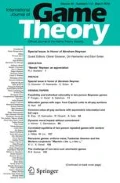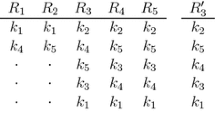Abstract
Two prominent mechanisms in the random assignment problem are the random priority (RP) and the probabilistic serial (PS). When agents are truthful, the outcomes obtained under PS have superior efficiency and fairness properties, but unlike RP, PS is vulnerable to strategizing. We study incentives of agents under PS. We find that when agents strategize, in equilibrium an outcome may be obtained under PS which is not efficient or fair and which is worse in some respects than the RP outcome. The results of our equilibrium analysis of PS call for caution when implementing it in “small” assignment problems.
Similar content being viewed by others
Notes
See Roth and Sotomayor (1990) for an early survey of the literature on assignment problems allowing for monetary transfers.
RP is called “random serial dictatorship” and has been shown to be equivalent to “core from random endowments” by Abdulkadiroğlu and Sönmez (1998).
In this paper we use the sd- terminology (sd- standing for “stochastic dominance”), adapted from Thomson (2012). What is referred to as “ordinally efficient, envy-free, weakly envy-free, strategy-proof, and weakly strategy-proof” in BM’s paper are referred to in our paper as, respectively, “sd-efficient, sd-envy-free, weakly sd-envy-free, sd-strategy-proof, and weakly sd-strategy-proof.”
Budish et al. (2013) also pursue an equilibrium analysis for interpreting the outcomes of the celebrated “Boston mechanism” in the context of school choice.
See, for example, Ehlers and Massó (2007) and the references therein.
See Heo and Manjunath (2012) for a study of implementation in weak sd-NE and sd-NE of social choice correspondences in a randomized setting.
Even though in the present context the central planner does not utilize monetary payments, agents themselves may resort to bribing one another in monetary terms when faced with a “bossy” mechanism.
Note that \(r\) \(S\!D(\succ _{i}^{T})\, \overline{r}\) implies that \(r(s,\succ _{i}^{T})>\overline{r}(s,\succ _{i}^{T})\) for some \(s\in \{1,\ldots ,k-1\}\).
Note that \(R\, S\!D(\succ ^{T})\, \overline{R}\) implies that \(R_{i}\,SD(\succ _{i}^{T})\, \overline{R}_{i}\) for some \(i\in I\).
To put it in another way, a random assignment is sd-envy-free (weakly sd-envy-free) if no agent weakly sd-envies (sd-envies) another.
Another open question is whether or not the truthful profile constitutes an sd-NE when an sd-NE exists. Notice that Theorem 1 says nothing about this; the truthful profile is indeed an sd-NE, however, in the cases that we considered where an sd-NE exists (under the “at most one desirable object” assumption and in Example 2).
References
Abdulkadiroğlu A, Sönmez T (1998) Random serial dictatorship and the core from random endowments in house allocation problems. Econometrica 66:689–701
Abdulkadiroğlu A, Sönmez T (1999) House allocation with existing tenants. J Econ Theory 88(2):233–260
Abdulkadiroğlu A, Sönmez T (2003) School choice: a mechanism design approach. Am Econ Rev 93–3:729–747
Bogomolnaia A, Moulin H (2001) A new solution to the random assignment problem. J Econ Theory 100(2):295–328
Bogomolnaia A, Moulin H (2002) A simple random assignment problem with a unique solution. Econ Theory 19(3):623–635
Budish Eric, Che Y-K, Kojima F, Milgrom P (2013) Designing random allocation mechanisms: theory and applications. Am Econ Rev 103(2):585–623
Che Y-K, Kojima F (2010) Asymptotic equivalence of probabilistic serial and random priority mechanisms. Econometrica 78(5):1625–1672
Crès H, Moulin H (2001) Scheduling with opting out: improving upon random priority. Oper Res 49(4):565–577
Chen Y, Sönmez T (2002) Improving efficiency of on-campus housing: an experimental study. Am Econ Rev 92(5):1669–1686
Ehlers L, Massó J (2007) Incomplete information and singleton cores in matching markets. J Econ Theory 136(1):587–600
Ergin H, Sönmez T (2006) Games of school choice under the Boston mechanism. J Public Econ 90(1):215–237
Heo EJ, Manjunath V (2012) Implementation in stochastic dominance nash equilibria. Working Paper
Hylland A, Zeckhauser R (1979) The efficient allocations of individuals to positions. J Political Econ 87(2):293–314
Hugh-Jones D, Kurino M, Vanberg C (2014) An experimental study on the incentives of the probabilistic serial mechanism. Games Econ Behav 87:367–380
Katta A-K, Sethuraman J (2006) A solution to the random assignment problem on the full preference domain. J Econ Theory 131(1):231–250
Kesten O (2009) Why do popular mechanisms lack efficiency in random environments. J Econ Theory 144(5):2209–2226
Kesten O, Ünver MU (2011) A theory of school choice lotteries. Working Paper
Kojima F (2009) Random assignment of multiple indivisible objects. Math Soc Sci 57(1):134–142
Kojima F, Manea M (2010) Incentives in the probabilistic serial mechanism. J Econ Theory 145(1):106–123
Manea M (2008) A constructive proof of the ordinal efficiency welfare theorem. J Econ Theory 141(1):276–281
McLennan A (2002) Ordinal efficiency and the polyhedral separating hyperplane theorem. J Econ Theory 105(2):435–449
Roth AE, Sotomayor M (1990) Two-sided matching: a study in game-theoretic modeling and analysis. Econometric society monographs. Cambridge University Press, Cambridge
Roth AE, Sönmez T, Ünver MU (2004) Kidney exchange. Q J Econ 119(2):457–488
Thomson W (2012) Strategy-proof allocation rules. Working Paper
Yılmaz Ö (2010) The probabilistic serial mechanism with private endowments. Games Econ Behav 69(2):475–491
Acknowledgments
We would like to thank Utku Ünver, Morimutsu Kurino, and two anonymous referees for useful discussions and comments.
Author information
Authors and Affiliations
Corresponding author
Rights and permissions
About this article
Cite this article
Ekici, Ö., Kesten, O. An equilibrium analysis of the probabilistic serial mechanism. Int J Game Theory 45, 655–674 (2016). https://doi.org/10.1007/s00182-015-0475-9
Accepted:
Published:
Issue Date:
DOI: https://doi.org/10.1007/s00182-015-0475-9
Keywords
- Random assignment
- Probabilistic serial
- Random priority
- Nash equilibrium
- Stochastic dominance
- Sd-efficiency
- Sd-no-envy




